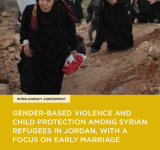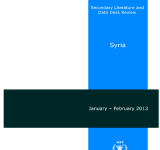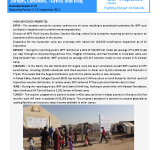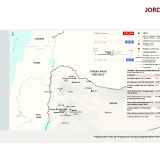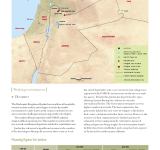Syrians
This report is the product of a meeting between The Ministry of Planning and International Cooperation (MOPIC) and the United Nations team regarding displaced Syrians in Jordan. It assesses the overall situation;; along with the humanitarian needs and coping mechanisms of Syrians in Jordan;; and provides a framework for relief interventions.
The purpose of this desk review is to uncover the food security and nutrition information available on the three target countries;; to advise WFP on the absence of any relevant information that would prevent a comprehensive evaluation of refugee food security status;; and to provide guidance on areas for primary data collection during the March 2013 Joint Assessment Mission (JAM).
During the reporting period;; World Food Programme (WFP) distributed a total of 340;;000 hot meals (an average of 52;;000 meals per day) through its implementing partners TUA;; Thaghar Al Madina;; and Radi Shedifat in Al Za'atari camp and King Abdullah Park. In addition;; WFP provided an average of 4;;213 welcome meals to new arrivals in Al Za'atari Camp. The following report details such endeavors.
This report outlines the regional response plan to Syrian refugees. It gives an overview of the situation of Syrian refugees in Jordan;; the plans and strategies that have be put in place to accommodate them. The overarching priorities in 2013 remain the registration and documentation of new arrivals;; basic protection;; and life-saving activities;; specifically: the establishment of adequate camp infrastructure;; provision of non-food items (NFI) to new arrivals in camps;; access to health care;; food assistance;; access to clean water in camps;; and physical protection including response to and prevention of sexual and gender-based violence (SgBV). Other essential activities include the identification and protection of unaccompanied and separated children (UA/SC);; access to education services and subsistence aid to the most vulnerable among the non-camp refugee population;; and improving access to water in refugee- hosting communities.
This report provides an overview of UNHCR operations profile in Jordan in 2014. It includes an summary of the situation of refugees and asylum seekers in Jordan;; their figures and UNHCR's reponse in terms of strategies and projects.
This report provides an overview of UNHCR operations profile in Jordan in 2013. It includes an summary of the situation of refugees and asylum seekers in Jordan;; their figures and UNHCR's reponse in terms of strategies and projects.

